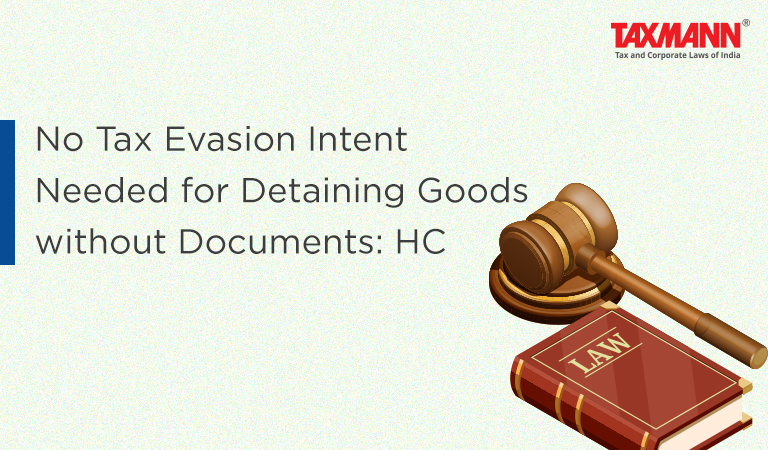No Tax Evasion Intent Needed for Detaining Goods without Documents: HC
- Blog|News|GST & Customs|
- 2 Min Read
- By Taxmann
- |
- Last Updated on 4 April, 2023

Case Details: Sterile India (P.) Ltd. v. Union of India - [2023] 149 taxmann.com 5 (Punjab & Haryana)
Judiciary and Counsel Details
-
- Tejinder Singh Dhindsa & Pankaj Jain, JJ.
- Ms Shweta Jain & Ms Anshul Mittal, Advs. for the Petitioner.
- Anshuman Chopra & Ms Shruti Jain Goyal for the Respondent.
Facts of the Case
The petitioner was engaged in manufacturing of Pharmaceuticals. The department intercepted the vehicle and detained goods of the petitioner on the ground that Part-B of the E-Way bill was not entered. The order of detention was passed and goods were release after furnishing bank of guarantee.
The petitioner filed appeal against the detention order but the Appellate Authority rejected the appeal. It filed writ petition to challenge and orders passed by the authorities and contended that there was no intention to evade tax and the penalty should not be levied.
High Court Held
The Honorable High Court noted that the goods were intercepted during transit and documents accompanying goods were not in compliance with provisions of GST Act. In the instant case, the authorities were within their power to detain goods and demand penalty since e-way bills along with tax invoices and delivery challans were produced by driver of the vehicle but Part-B of E-Way bill was not entered.
The Court also noted that the authorities are not required to establish intention to evade payment of tax for detaining goods under section 129 of CGST Act, 2017. The petitioner had already made payment under Section 129(3), therefore, all proceedings in respect to the notice were deemed to have been concluded. Thus, there was no ground to interfere in the impugned order and the petition was dismissed.
Disclaimer: The content/information published on the website is only for general information of the user and shall not be construed as legal advice. While the Taxmann has exercised reasonable efforts to ensure the veracity of information/content published, Taxmann shall be under no liability in any manner whatsoever for incorrect information, if any.

Taxmann Publications has a dedicated in-house Research & Editorial Team. This team consists of a team of Chartered Accountants, Company Secretaries, and Lawyers. This team works under the guidance and supervision of editor-in-chief Mr Rakesh Bhargava.
The Research and Editorial Team is responsible for developing reliable and accurate content for the readers. The team follows the six-sigma approach to achieve the benchmark of zero error in its publications and research platforms. The team ensures that the following publication guidelines are thoroughly followed while developing the content:
- The statutory material is obtained only from the authorized and reliable sources
- All the latest developments in the judicial and legislative fields are covered
- Prepare the analytical write-ups on current, controversial, and important issues to help the readers to understand the concept and its implications
- Every content published by Taxmann is complete, accurate and lucid
- All evidence-based statements are supported with proper reference to Section, Circular No., Notification No. or citations
- The golden rules of grammar, style and consistency are thoroughly followed
- Font and size that’s easy to read and remain consistent across all imprint and digital publications are applied



 CA | CS | CMA
CA | CS | CMA
